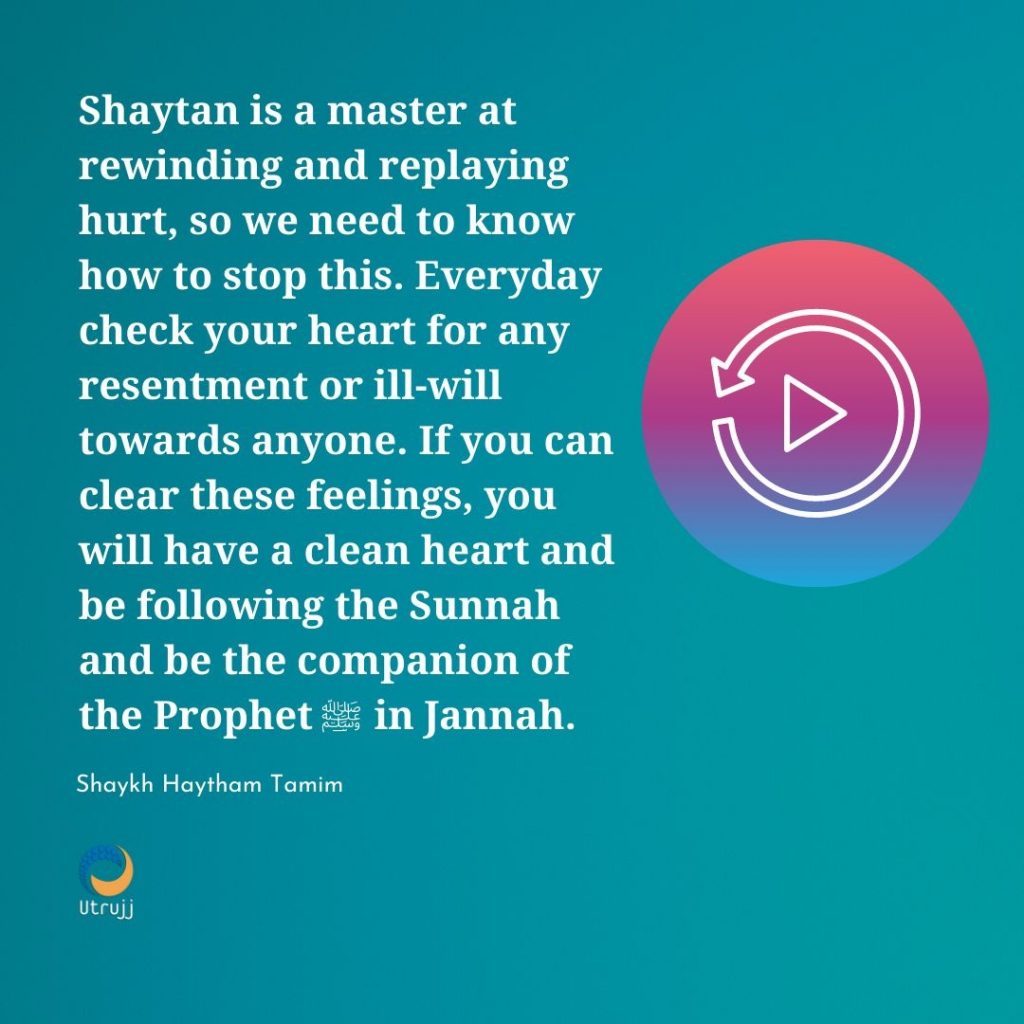Block the 3 windows of Shaytan

Getting a grip on Anger, Fear and Sadness
Is shaytan more powerful than us or not?
Shaytan has the ability to disappear, but you don’t. He can take different shapes but you can’t. He can see you, but you can’t see him. He can influence you, but you can’t influence him. He can come and whisper to you. He can ruin anything you are doing. Without doubt he is powerful.
The jinn can also fly. They get from one place to another in a flash. They move things. For instance, in the story of Suleiman (peace be on him), the jinn were so powerful they built palaces and fortresses effortlessly. Among them are giants, as well as normal sized ones and smaller ones. They have different powers. While we need planes to travel long distances, they don’t. They travel very quickly and don’t need visas.
Shaytan’s promise and success
Shaytan promised Allah Almighty that he would incite people to change their appearances:
“And I will mislead them, and I will entice them, and I will prompt them to slit the ears of cattle, and I will prompt them to alter the creation of God.” Whoever takes Satan as a lord, instead of God, has surely suffered a profound loss. (4:119)
We see this ayah in action today, as shaytan commands people to change their form, and succeeds in this mission through beautification, botox, plastic surgery and so on. These all alter the creation of Allah Almighty. Shaytan has fulfilled his promise. In return Allah Almighty says:
Over My servants you have no authority, except for the sinners who follow you. (15:42)
With all the power I have given you, my servants you have no control over them, except those who decide to follow you.
Therefore with all his powers, and that of his offspring, if we decide not to follow him, he cannot control us. Yes, we are weak and if we rely on ourselves alone, we can easily be defeated.
What is the password we can use to get our firewall and protection?
Allah Almighty has given us the words that protect us from shaytan:
‘audhubillahi minashaytani rajeem’
When a temptation from the Devil provokes you, seek refuge in God; He is the Hearer, the Knower. (41:36)
Audhu means ‘I seek refuge’. When you say these words and mean them, Allah Almighty protects you. When do you seek refuge? When you feel scared, terrified, weak and you need support. If you don’t mean it, it is powerless.
The gym
Going to the gym beefs up your muscles, but even there shaytan is lurking and more powerful than you. He can make you waste your time body building and forget your salah. Being powerful is not about building muscles it’s about building your connection with Allah Almighty. It is not physical, it’s spiritual. The more connected you are the more control you have.
The remote control
In the moments when we are overwhelmed by emotion, we hand over control to shaytan. It’s like giving him the remote control to control us. One of the potent emotions which is results in this is anger. When we are angry, shaytan pushes all your buttons. So be careful.
The window to shaytan
There are three windows mainly that let shaytan in: anger, sadness, and fear. When you are controlled by your emotions then shaytan dictates to you what to do and tells you what to say. And often when you calm down afterwards, you regret what you said and did.
Lack of control and regret
The Prophet (peace be on him) on his journey to Meraj, (his ascension to the heavens), passed by the prophets and messengers and was shown different aspects of heaven and hell. At one point, he saw a big bull with horns come out of a small hole, but he then struggled to go back down it, as he could not squeeze back in. When the Prophet (peace be on him) asked Jibril what it was, and Jibril said it was the words that had been uttered but could not be taken back. Narrated by Al-Bazzaar.
Prophetic ways to diffuse anger
There are several ways from the sunnah to diffuse anger, these include the following:
- Istiadha
Say audhobillah (‘I seek refuge in Allah’) and mean it. Then you have transferred your case to Allah’s court. Be aware that you are seeking His support and are not just doing lip service. Understand what you say for it to work. Like voice recognition, it doesn’t always work. So it has to be said mindfully. Sulayman ibn Sard said:
I was sitting with the Prophet (peace and blessings of Allah be upon him), and two men were slandering one another. One of them was red in the face, and the veins on his neck were standing out. The Prophet (peace be on him) said, ‘I know a word which, if he were to say it, what he feels would go away. If he said “I seek refuge with Allah from the Shaytan,” what he feels (i.e., his anger) would go away.’” (Bukhari)
The Prophet (peace and blessings of Allah be upon him) said:
If a man gets angry and says, ‘I seek refuge with Allah,’ his anger will go away. (Bukhari)
- Be silent
Don’t say anything. Stay silent and you won’t regret it. Try it and see how it goes.
The Prophet (peace be on him said:
If any of you becomes angry, let him keep silent. (Imam Ahmad)
- Make wudu
When your temper is fiery, make wudu. Shaytan is made of fire, so extinguish him with water. The Prophet (peace be on him) said:
Anger comes from the devil, the devil was created of fire, and fire is extinguished only by water; so when one of you becomes angry, he should perform ablution.” (Abu Dawoud)
- Salah
Pray 2 rakahs
- Change your position – if you are standing sit down if you are sitting lie down. If you are in one room, leave the room. Go somewhere else to control your anger. The Messenger of Allah (peace on him) said:
If one of you is angry while he is standing, let him sit down so his anger will leave him; otherwise, let him lie down. (Abu Dawoud)
- There is an authentic narration to lie down flat on the floor.
These prophetic recommendations block the window so shaytan cannot control us.
Whoever believes in Allah and the last day let him say something good or be silent. (Bukhari)
Don’t allow shaytan to control you. You can go out and talk a walk do tasbih or istighar, lie flat, or go for a run in the park.
Sadness
The second window to shaytan is sadness which can even lead to physical and mental illness; extreme sadness can even cause a stroke or diabetes. ‘Normal sadness’ is part of our nature. Someone who is never sad is not normal. Deep sadness which paralyses you is not good. Shaytan can easily prey on you, when you are sad. Similar to anger, you can say wild things when you are upset- it is close to anger but not anger.
Excessive sadness can lead to kufr
Some people in their excessive sadness can lead to depression and severe depression can lead to kufr. In recent years, with the acute suffering of Muslims in so many parts of the world, they ask ‘Where is Allah?! I don’t believe in Him. How could He allow this suffering?’ These comments emanate from sadness and the whispers of shaytan.
This is why Allah Almighty associated sadness generally in the Quran with negativity, except on a few occasions like the migration of the Prophet (peace be on him) from Makkah to Madinah, when he stopped in small cave with Abu Bakr, who was terrified that they would be found, the Quran relates that,
He (Muhammad) said to his companion, ‘Do not worry, Allah is with us.’ (9:40)
We need to be careful not to let sadness control us.
What is the mechanism to escape sadness?
Usually you are sad because you have been afflicted by a trial, tribulation or calamity. Allah Almighty taught us in Surah Baqarah to say Inna lillahi wa inna ilayhi raji’oun:
And We will surely test you with something of fear and hunger and a loss of wealth and lives and fruits, but give good tidings to the patient,
Who, when disaster strikes them, say, ‘Indeed we belong to Allah, and indeed to Him we will return.’ (2:155-156)
Those who are afflicted, should say this statement. And this is why we usually say Inna lillahi wa inna ilayhi raji’un when someone dies. When you say this, it brings back to your mind and heart that this dunya is a place of test and Allah Almighty is testing you, your quality, imaan, perservance and sabr. So don’t allow shaytan to let you lose it.
We do not have a licence to go wild in our sadness. It is not acceptable. Instead, a Muslim should react to calamities and tests Islamically, with duas. These bring us back to Allah Almighty:
Inna lillahi wa inna ilayhi raji’un
Indeed we belong to Allah, and indeed to Him we will return.’ (2:155-156)
Allahumma ajirni fi musibati wa akhluf li khairan minha
O Allah! Protect me in this calamity that has befallen me and replace it with something better.
Hasbunallahu wa Ni’mal Wakeel
Allah (Alone) is Sufficient for us, and He is the Best Disposer of affairs (for us). (3:173)
Umm Salamah (May Allah be pleased with her) reported that she heard the Messenger of Allah (peace be on him) saying:
When a person suffers from a calamity and utters: ‘Inna lillahi wa inna ilaihi raji’un. Allahumma ujurni fi musibati, wakhluf li khairan minha (We belong to Allah and to Him we shall return. O Allah! Compensate me in my affliction, recompense my loss and give me something better in exchange for it), then Allah surely compensates him with reward and better substitute.
‘ Umm Salamah (may Allah be pleased with her) said: When Abu Salamah (May Allah be pleased with him) died, I repeated the same supplication as the Messenger of Allah (peace be on him) had commanded me (to do). So Allah bestowed upon me a better substitute than him (I was married to Muhammad, the Messenger of Allah (peace be on him).
When hypocrites taunted the Muslims that huge troops were mobilised against them, saying the dua ‘hasbunallahu wa ni’mal wakeel’ increased their faith. These duas bring us closer to Allah Almighty rather than to Shaytan. If you are not close to Allah Almighty, you are close to shaytan. There is no middle state.
Fear
The third window shaytan can prey on you is fear. It can lead to imaginary fears magnified beyond all probability. Shaytan floods you with all the alarming scenarios in the world. When someone has the possibility of bad news, their imagination can run wild – especially mothers whose fears can escalate within moments to the very worst outcome, which develops anxiety and might lead to obsessive compulsive disorder OCD. How did they get there? Shaytan inspired them with evil thoughts. I have witnessed this many times. Once on hajj, in our group there was an old lady who was very anxious to the point of OCD. This woman’s daughter had left something in her room so she got off the bus, very soon her mother started getting more and more anxious, to the point of hysteria, saying her daughter might have been kidnapped, or had an accident, and was ready to call an ambulance. Ten minutes later, the daughter (who had not been chopped into pieces or eaten by dogs!) returned. This paranoia and anxiety is a recipe for disaster. Anxiety is contagious. It raises your blood pressure to the roof. This can lead to depression.
We can all be weak but remember the Prophet’s (peace be on him) recommendations.
How can we fight fear?
The prophetic recommendations are: Fulfil your obligations, do dhikr, have tawakkul (rely) on Allah and trust Him. And of course, make du’a.
The believers are those whose hearts tremble when God is mentioned, and when His revelations are recited to them, they strengthen them in faith, and upon their Lord they rely. (8:2)
Those who believe, and do good deeds, and pray regularly, and give charity—they will have their reward with their Lord; they will have no fear, nor shall they grieve. (2:277)
Those who say, ‘Our Lord is God,’ then lead a righteous life—they have nothing to fear, nor shall they grieve. (46:13)
‘Uthman bin ‘Affan (may Allah be pleased with him) reported that the Messenger of Allah (peace be on him) said:
He who recites three times every morning and evening: ‘Bismillahil-ladhi la yadurru ma’as-mihi shai’un fil-ardi wa la fis-sama’i, wa Huwas-Sami’ul-‘Alim (In the Name of Allah with Whose Name there is protection against every kind of harm in the earth or in the heaven, and He is the All-Hearing and All- Knowing),’ nothing will harm him. (Abu Dawud and At- Tirmidhi)
Mental illness
Those who suffer from paranoia need help. But as mental illness is a taboo in our community, people choose to suffer than to seek treatment or have it mentioned on their record. They blame their issues on black magic (sihr) or evil eye (nadhr) but in fact they need specialist help, support and medication. They are not bad people but they ned to know how to get out of their predicament. We need to understand these conditions and be aware of the gates and windows of shaytan. Allah Almighty gave us the map to get out of the maze, and taught to ask Him to guide us to the straight path.
The nature of dunya
Remember whenever we face something we dislike, it’s a test. Welcome on board. Dunya is not a place of luxury. Luxury is not haram, but don’t expect that dunya will be luxury. Prepare yourself that dunya is place of test. Any hardship you encounter is part of the package. It is testing your patience, commitment, principles and closeness to Allah Almighty.
Some people claim they have principles but when you test them they fail. Some say they can work in a group but when you put them in group they are self-centred. These tests help you know yourself better and to ascertain your weaknesses. Then you have to work on those qualities to improve them, to control your anger, or increase your patience, or to purify your heart and this leads to goodness.
Related posts

Recommended Posts

How Allah strengthens the hearts of believers
April 19, 2024

Don’t be a Ramadani person – Be a Rabbani person.
April 10, 2024


